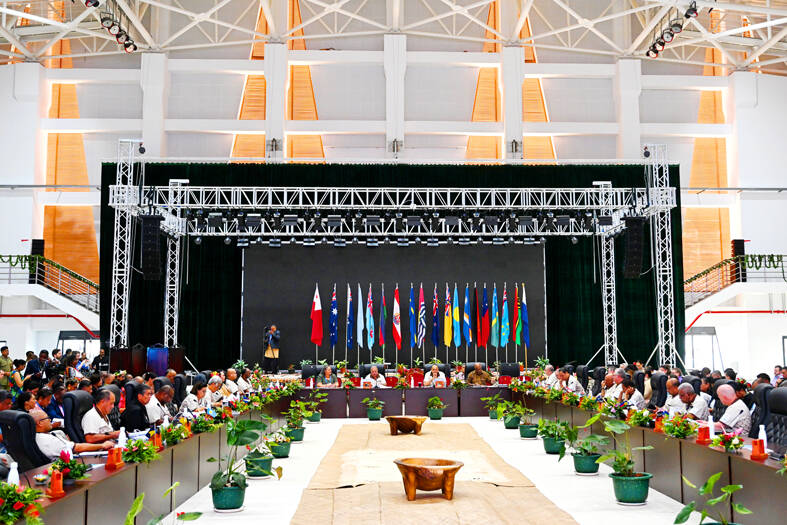The Pacific Islands Forum has endorsed a plan to boost police numbers among its members, cutting the need to rely on external forces in a crisis, with China security ally Solomon Islands supporting the Australian-funded initiative yesterday.
The bloc of 18 nations has the potential to play a strong and active role in regional security, Cook Islands Prime Minister Mark Brown, the forum’s chairman, said on the final day of an annual meeting of leaders.
The Pacific Islands were “a region of collaboration and support and working together, rather than a region of competition and a region where other countries look to try to gain an advantage over us,” he told a news conference in Tonga.

Photo: EPA
Some analysts see the plan to set up a regional policing unit to be deployed to tackle major incidents as a move by Australia to block China’s growing police presence in the region, amid strategic rivalry between Beijing and Washington.
The Solomons, which has police ties with Australia, the forum’s largest member, as well as China, which is not a member, said it had agreed to the Pacific Policing Initiative.
“We also endorse, as part of developing this initiative, the importance of national consultation, so that it is owned and driven by countries, so we really do appreciate the initiative,” Solomon Islands Prime Minister Jeremiah Manele said.
Tongan Prime Minister Siaosi Sovaleni said it would reinforce the existing regional security architecture.
The leaders also agreed to the terms of a fact-finding mission to New Caledonia, riven by months of riots, for talks with relevant parties to try and resolve the crisis, he said.
In addition, the forum accepted US territories Guam and American Samoa as associate members, a final communique showed.

CHAOS: Iranians took to the streets playing celebratory music after reports of Khamenei’s death on Saturday, while mourners also gathered in Tehran yesterday Iranian Supreme Leader Ayatollah Ali Khamenei was killed in a major attack on Iran launched by Israel and the US, throwing the future of the Islamic republic into doubt and raising the risk of regional instability. Iranian state television and the state-run IRNA news agency announced the 86-year-old’s death early yesterday. US President Donald Trump said it gave Iranians their “greatest chance” to “take back” their country. The announcements came after a joint US and Israeli aerial bombardment that targeted Iranian military and governmental sites. Trump said the “heavy and pinpoint bombing” would continue through the week or as long

TRUST: The KMT said it respected the US’ timing and considerations, and hoped it would continue to honor its commitments to helping Taiwan bolster its defenses and deterrence US President Donald Trump is delaying a multibillion-dollar arms sale to Taiwan to ensure his visit to Beijing is successful, a New York Times report said. The weapons sales package has stalled in the US Department of State, the report said, citing US officials it did not identify. The White House has told agencies not to push forward ahead of Trump’s meeting with Chinese President Xi Jinping (習近平), it said. The two last month held a phone call to discuss trade and geopolitical flashpoints ahead of the summit. Xi raised the Taiwan issue and urged the US to handle arms sales to

BIG SPENDERS: Foreign investors bought the most Taiwan equities since 2005, signaling confidence that an AI boom would continue to benefit chipmakers Taiwan Semiconductor Manufacturing Co’s (TSMC, 台積電) market capitalization swelled to US$2 trillion for the first time following a 4.25 percent rally in its American depositary receipts (ADR) overnight, putting the world’s biggest contract chipmaker sixth on the list of the world’s biggest companies by market capitalization, just behind Amazon.com Inc. The site CompaniesMarketcap.com ranked TSMC ahead of Saudi Aramco and Meta Platforms Inc. The Taiwanese company’s ADRs on Tuesday surged to US$385.75 on the New York Stock Exchange, as strong demand for artificial intelligence (AI) applications led to chip supply constraints and boost revenue growth to record-breaking levels. Each TSMC ADR represents

State-run CPC Corp, Taiwan (CPC, 台灣中油) yesterday said that it had confirmed on Saturday night with its liquefied natural gas (LNG) and crude oil suppliers that shipments are proceeding as scheduled and that domestic supplies remain unaffected. The CPC yesterday announced the gasoline and diesel prices will rise by NT$0.2 and NT$0.4 per liter, respectively, starting Monday, citing Middle East tensions and blizzards in the eastern United States. CPC also iterated it has been reducing the proportion of crude oil imports from the Middle East and diversifying its supply sources in the past few years in response to geopolitical risks, expanding